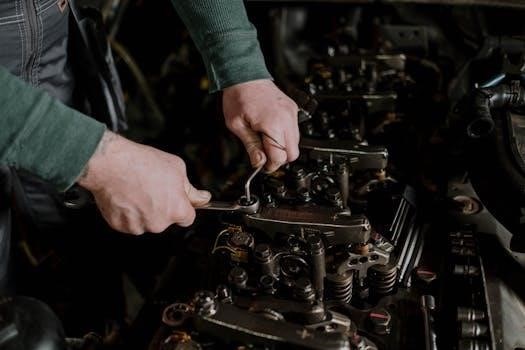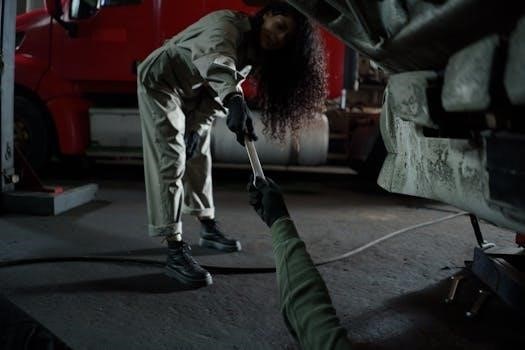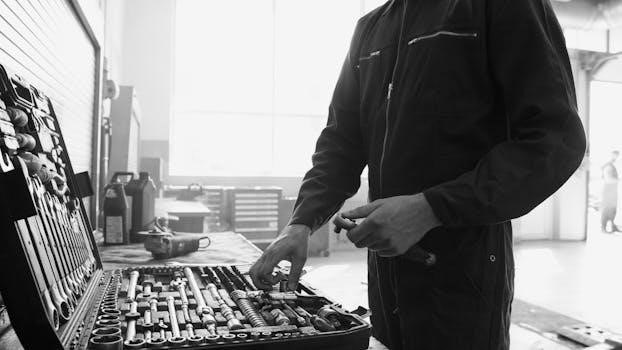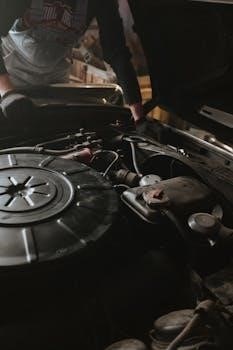Automotive Workshop Tools⁚ A Comprehensive List
Equipping an automotive workshop requires a comprehensive selection of tools. This list includes essential hand tools, lifting equipment and power tools.
From socket sets to automotive lifts, these tools ensure efficient and safe vehicle maintenance and repair.

Essential Hand Tools
Essential hand tools are the cornerstone of any automotive workshop, providing the precision and control needed for a wide range of tasks. A well-equipped mechanic relies heavily on these tools for diagnostics, repairs, and maintenance.
This category encompasses a variety of instruments, including screwdriver sets with various sizes and types (flathead, Phillips, Torx), ensuring compatibility with different fasteners. Wrench sets, both combination and specialty, are indispensable for loosening and tightening bolts and nuts. Pliers, available in numerous forms such as needle-nose, slip-joint, and locking, offer versatility for gripping, cutting, and manipulating components.
Hammers, including ball peen, dead blow, and rubber mallets, are crucial for striking and shaping metal without causing damage. Pry bars assist in separating components and providing leverage. Measuring tools, like tape measures and calipers, ensure accurate measurements for precise work. These hand tools, when properly selected and maintained, form the foundation of an efficient and effective automotive repair operation.
Socket Sets and Ratchets
Socket sets and ratchets are indispensable for any automotive technician, offering a versatile solution for tightening and loosening fasteners with efficiency and precision. A comprehensive socket set includes a range of socket sizes in both metric and SAE (standard) measurements to accommodate various vehicle makes and models.
The sockets themselves come in different drive sizes (1/4″, 3/8″, 1/2″) to handle varying torque requirements. Ratchets provide the leverage needed to turn sockets, and high-quality ratchets feature fine-tooth mechanisms for smooth operation and minimal swing arc, especially useful in tight spaces. Extensions and universal joints further enhance accessibility, allowing technicians to reach fasteners in awkward locations.
Impact sockets, made from hardened steel, are designed for use with impact wrenches, providing superior durability for high-torque applications. Investing in a durable and comprehensive socket set and ratchet system is essential for any well-equipped automotive workshop, significantly improving speed and effectiveness.
Wrench Sets⁚ Combination and Specialty
Wrench sets are a cornerstone of any automotive toolkit, providing the necessary leverage and grip for a wide array of mechanical tasks. Combination wrench sets, featuring an open-end wrench on one side and a box-end wrench on the other, offer versatility for various fastener types.
Having both metric and SAE sets ensures compatibility with different vehicle manufacturers and models. Specialty wrench sets cater to specific needs, such as flare nut wrenches for brake lines and fuel lines, preventing damage to sensitive fittings. Adjustable wrenches, also known as crescent wrenches, offer adaptability for various fastener sizes, although they should be used with caution to avoid rounding off nuts and bolts.
Pipe wrenches provide exceptional grip for plumbing-related tasks. Investing in high-quality wrench sets ensures durability and precise fit, reducing the risk of slippage and fastener damage. A well-equipped workshop should include a range of combination wrenches and specialized wrenches to handle any automotive repair scenario.
Screwdrivers and Torx Drivers
Screwdrivers and Torx drivers are indispensable hand tools for any automotive technician, essential for installing and removing various fasteners. A comprehensive screwdriver set should include a range of sizes and types, such as flathead, Phillips-head, and stubby screwdrivers, to accommodate different screw types and access tight spaces. High-quality screwdrivers feature ergonomic handles for comfortable grip and durable shafts for long-lasting performance.
Torx drivers, characterized by their star-shaped tips, are specifically designed for Torx screws, commonly found in automotive applications. Having a complete set of Torx drivers, including various sizes, ensures compatibility with different vehicle models. Impact screwdrivers can be used to loosen stubborn or corroded screws.
Magnetic tips on screwdrivers and Torx drivers can be particularly useful for preventing screws from dropping in hard-to-reach areas. Proper care and maintenance of screwdrivers and Torx drivers, such as keeping the tips clean and sharp, will extend their lifespan and ensure optimal performance, making them reliable tools in the automotive workshop.
Pliers⁚ Variety and Functionality
Pliers are versatile hand tools, vital for gripping, cutting, bending, and manipulating various components in automotive repairs. A well-equipped workshop should include a diverse range of pliers, each designed for specific tasks. Slip-joint pliers, with their adjustable pivot point, are excellent for general-purpose gripping and adjusting. Needle-nose pliers, featuring long, slender jaws, are ideal for reaching into tight spaces and manipulating small parts.
Diagonal cutting pliers are essential for cutting wires and small fasteners. Locking pliers, also known as Vise-Grips, provide a secure grip on objects, allowing for hands-free operation. Hose clamp pliers are specifically designed for removing and installing hose clamps without damaging the hoses.
Lineman’s pliers, with their robust construction, are suitable for heavy-duty gripping and cutting. Pliers with insulated handles are crucial for working on electrical systems, ensuring safety and preventing electrical shocks. Maintaining a clean and organized plier set, along with proper usage, will extend their lifespan and ensure reliable performance in the automotive workshop.

Lifting and Support Equipment
Lifting and support equipment are crucial for automotive workshops. These tools provide safe and efficient ways to elevate vehicles. Jacks, jack stands, and automotive lifts are essential for various repair tasks.
Jacks and Jack Stands

Jacks and jack stands are fundamental for safely lifting and supporting vehicles during maintenance and repair work. Jacks provide the initial lift, allowing technicians to raise the vehicle to the desired height. Common types include hydraulic floor jacks, scissor jacks, and bottle jacks, each suited for different vehicle weights and clearance requirements.
Jack stands are then placed under the vehicle’s frame or designated lifting points to provide secure and stable support, preventing accidental lowering. Always use jack stands after lifting a vehicle with a jack.
It is important to choose jack stands with appropriate weight capacity for the vehicle being serviced and to position them correctly to ensure stability and prevent damage. Proper use of jacks and jack stands is essential for technician safety and preventing accidents in the automotive workshop. Regular inspection and maintenance of these tools are critical to ensure their reliability and safe operation.
Automotive Lifts⁚ Types and Benefits
Automotive lifts are indispensable tools in modern workshops, significantly enhancing efficiency and safety. There are several types of automotive lifts, each designed for specific purposes. Two-post lifts are commonly used for general repair work, providing easy access to the vehicle’s underside. Four-post lifts are ideal for alignment services and heavier vehicles, offering greater stability.
Scissor lifts are compact and versatile, suitable for quick service tasks. The benefits of using automotive lifts include increased productivity, improved ergonomics, and enhanced safety. Lifts allow technicians to work comfortably and efficiently, reducing strain and fatigue. They also provide a safer working environment by securely elevating the vehicle, minimizing the risk of accidents.
Investing in quality automotive lifts is essential for any professional workshop, as they streamline operations, improve service quality, and ensure a safer workspace for technicians. Regular maintenance and inspections are crucial to keep these lifts operating safely and efficiently.

Power Tools for Automotive Repair
Power tools are essential for efficient automotive repairs. Impact wrenches, drills, and grinders increase speed and precision. These tools handle tough tasks, improving productivity in any workshop.
Impact Wrenches⁚ Corded and Cordless
Impact wrenches are indispensable power tools in automotive repair, designed for efficiently loosening or tightening stubborn nuts and bolts. Available in both corded and cordless options, each offers unique advantages for different workshop needs. Corded impact wrenches provide consistent power, ideal for heavy-duty tasks requiring sustained use without worrying about battery life. These are perfect for busy shops where continuous operation is essential.
Cordless impact wrenches, on the other hand, offer unmatched portability and convenience. Their battery-powered design allows mechanics to move freely around the vehicle and workshop, accessing tight spaces without being tethered to a power outlet. Modern cordless models boast impressive power, rivaling their corded counterparts. They are invaluable for roadside repairs or situations where access to electricity is limited. Choosing between corded and cordless depends on the specific demands of the job and the workshop environment, balancing power with mobility.
Drills and Grinders
Drills and grinders are versatile power tools crucial for a wide range of automotive repair tasks. Drills are essential for creating holes, removing damaged fasteners, and preparing surfaces for welding or bodywork. Available in various sizes and power levels, drills can handle everything from delicate interior work to heavy-duty chassis repairs. Cordless drills offer portability and convenience, while corded models provide consistent power for demanding jobs.
Grinders, on the other hand, are indispensable for cutting, grinding, and polishing metal surfaces. Angle grinders are commonly used for removing rust, smoothing welds, and shaping metal components. Die grinders are smaller and more maneuverable, ideal for intricate work in tight spaces. Bench grinders are stationary tools used for sharpening tools and shaping small parts. Both drills and grinders significantly enhance efficiency and precision in automotive repair, making them essential for any well-equipped workshop. Safety glasses are always recommended.
